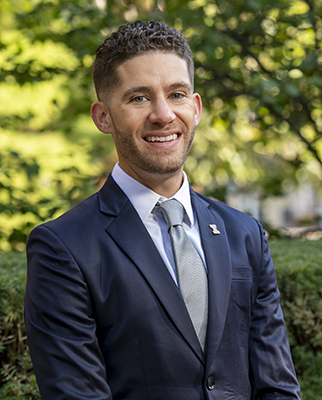Oct 17, 2023
Richter exploring secret language of tax disclosures
When it comes to sharing tax details, most companies follow a simple rule — when in doubt, leave it out. Corporate managers are notoriously tight-lipped about revealing any information that A) isn’t required and B) could open them up to potential IRS review. So, when they do volunteer tax-related information, there’s usually a reason. And exploring those reasons can yield interesting insights, according to incoming Gies assistant professor Stefan Richter.

“A lot of my projects have primarily focused on some aspect of tax disclosures,” said Richter, who is completing a PhD in accounting at Indiana University. For his dissertation, he stayed with that theme, exploring one disclosure in particular that’s received a lot of ink in corporate financials after the pandemic — the Employee Retention Tax Credit.
“I was reviewing corporate financial findings and saw so many of them were talking about it,” said Richter. “In the past, companies haven’t mentioned tax credits specifically, so that really led to my curiosity.” He decided he wanted to know what was going on behind the scenes and what incentives managers might have had to make their participation known.
The credit, which incentivized companies to retain and pay non-working employees during the COVID crisis, helped keep paychecks flowing during a time of great economic uncertainty and allowed firms to retain skilled workers they might otherwise have lost. But Richter theorized it was providing another benefit for companies who chose to report it — and that was damage control. Specifically, he believed that companies disclosing the credit might be attempting to improve damaged employee relationships.
Bad employee relations aren’t just a PR nightmare, said Richter. “Prior research finds that if a company has damaged its relations with the employees, it hurts the overall relationship between managers and employees and ultimately leads to a loss in shareholder wealth.” That means firms have a strong motivation to turn that situation around.
To test that theory, Richter looked at companies that had recently committed labor infractions, like OSHA violations, and discovered his instincts were correct. “I find these companies are significantly more likely to disclose the credit,” said Richter, who believes the disclosure provides evidence that managers are looking for ways to show their investors that they’re taking care of their employees. “It’s good way, and I think a credible way, for managers to make disclosures to the shareholders and potentially other stakeholders that review their financial disclosures.
Tax policy hasn’t always been a purely theoretical issue for Richter. After completing a master’s in accounting at Penn State, he spent nearly five years as a tax professional at Ernst & Young. But eventually, he realized his passions lay elsewhere. “Even as an undergrad, I always enjoyed researching,” said Richter. That passion took him back to school to get his PhD. And now, it’s bringing him to Gies.
“Gies is just a tremendous program,” said Richter, who applied when he saw an opening for a tax researcher on staff and was excited to join the team. “They have tremendous research faculty, and I’ve met many of them over the years.” Without hesitation, he mentioned several by name, including Benjamin Osswald, Michael Donohoe and Michelle Hutchens — who Richter has already collaborated with on various research projects. “Also Eric Beardsley just came to Gies last year, so, just having that great core group of tax people to bounce ideas off of and hopefully collaborate with more was a very appealing aspect.”
Richter says his new fellow faculty members have been very welcoming, even offering to help him and his wife acclimate to their new home. “I think just being surrounded by such a great group of people will be really great for my career. Just being part of that working environment is super appealing and what I’m looking forward to.”
He's also excited to be teaching at one of the nation’s leading business schools. “On the teaching side, the university is ranked in the top two or three in a lot of different areas, depending on which ranking you’re looking at. So, coming in with a highly motivated group of faculty that really care about teaching was another appealing aspect.”
Richter, who will be teaching the introductory tax class, says he looks forward to being in front of the class, although he realizes taxes can be a tough sell for some of those entering the door. “Sometimes it’s a hit or miss with students,” said Richter. Perhaps that’s because tax policy seems so cut and dried. But that’s not always the case, said Richter. There are plenty of grey areas — and many interesting jobs out there for graduates who can help companies sort them out. “I look forward to making it a little more exciting and drawing a couple of other students over to the tax side as they go through the program.”
